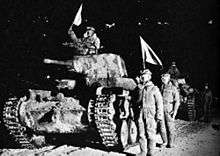3rd Tank Division (Imperial Japanese Army)
The 3rd Tank Division (戦車第3師団, Sensha Dai-san Shidan), was one of four armored divisions of the Imperial Japanese Army in World War II.
| 3rd Tank Division | |
|---|---|
 A Type 97 Shinhoto Chi-Ha tank of the 3rd Tank Division during Operation Ichi-Go in northern China, December 1944 | |
| Active | 1942 - 1945 |
| Country | |
| Branch | Imperial Japanese Army |
| Type | Armored division |
| Garrison/HQ | Tokyo, Japan |
| Nickname(s) | 滝 = Taki (Torrent) |
| Engagements | Second Sino-Japanese War World War II |
History
The 3rd Tank Division was raised in Inner Mongolia in 1942[1] as part of the Japanese Northern China Area Army under the overall aegis of the Mongolia Garrison Army.
Initially tasked primarily with border patrol of Manchukuo's western frontier with the Soviet Union, from April 1944, it participated in Operation Ichi-Go in northern China against the National Revolutionary Army of the Republic of China.[2] The two primary goals of Ichi-go were to open a land route to French Indochina, and capture air bases in southeast China from which American bombers were attacking the Japanese homeland and shipping.[3]
The 3rd Tank Division’s IJA 8th Armored Regiment (formerly based in Mukden) was detached in June 1944, and transferred to the control of the Japanese Eighth Area Army in Rabaul.
The IJA 12th Armored Regiment, formerly based in Taiyuan, was withdrawn to bolster the defenses of Seoul in Korea towards the closing stages of the war and as part of the Japanese Seventeenth Area Army was in combat against the Soviet Red Army’s invasion of Manchuria.
The IJA 13th Armored Regiment, normally based in Hankou was withdrawn to Tianjin in 1944, and ended the war in Changsha. The IJA 17th Armored Regiment ended the war in Tianjin.
The 3rd Tank Division was officially demobilized in September 1945 with the rest of the Imperial Japanese Army.
Commanding officer
| Name | From | To | |
|---|---|---|---|
| 1 | Lieutenant General Isaku Nishihara | 1 December 1942 | 7 January 1944 |
| 2 | Lieutenant General Hideo Yamaji | 7 January 1944 | 30 September 1945 |
See also
Notes
- Rottman & Takizawa 2008, p. 12.
- Rottman & Takizawa 2008, pp. 41, 42.
- Sherry, p. 21.
References
- Frank, Richard B (1999). Downfall: The End of the Imperial Japanese Empire. New York: Random House. ISBN 0-679-41424-X.
- Jowett, Bernard (1999). The Japanese Army 1931-45 Volume 2, 1942-45). Osprey Publishing. ISBN 1-84176-354-3.
- Madej, Victor (1981). Japanese Armed Forces Order of Battle, 1937-1945. Game Publishing Company. ASIN: B000L4CYWW.
- Rottman, Gordon L.; Takizawa, Akira (2008). World War II Japanese Tank Tactics. Osprey Publishing. ISBN 978-1846032349.CS1 maint: ref=harv (link)
- Sherry, Mark D. China Defensive. The U.S. Army Campaigns of World War II. United States Army Center of Military History. CMH Pub 72-38.CS1 maint: ref=harv (link)